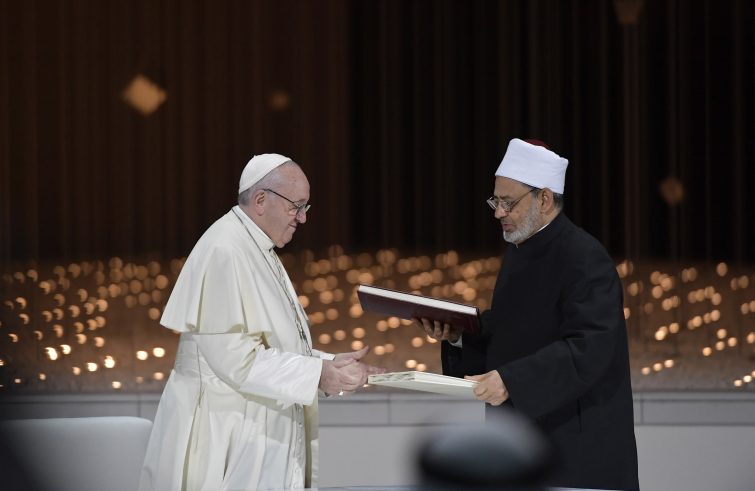
“A veritable ray of light and hope”, even in a world where winds of war are blowing and dialogue can sometimes be compromised or threatened. Thus Islamic theologian Shahrzad Houshmand defines document on Human Fraternity signed exactly a year ago by the Pope and by the Grand Imam of Al-Azhar. “It’s like a date from the tree of encounter”, she told SIR, ” like a ripple that pushes us to adjust erroneous or obtuse interpretations of our religion.”
 A year has passed since the historic signing of the Abu Dhabi document. What impact has it had on the Muslim world?
A year has passed since the historic signing of the Abu Dhabi document. What impact has it had on the Muslim world?
In Abu Dhabi, for the first time in history, the two leaders of the two major world religions embraced, wrote and jointly proposed a document in a fair and equal manner. This is undoubtedly a historic achievement, but it must be remembered that the Abu Dhabi document is not an absolute novelty, indeed it is the fruit of a journey, resulting from as many as 60 meetings. The most important step in the dialogue between Catholics and Muslims was taken by the Second Vatican Council, with a revision of the dialogue with the Islamic world that can be regarded as major breakthrough. Moreover, the last three Popes devoted much effort to this subject: suffice it to mention John Paul II’s visit to the Damascus mosque and his meeting with 70,000 Muslims on his visit to Morocco. Benedict XVI, in 2012, referred to dialogue as a time when the encounter with the our fellow other becomes mutual “nourishment and support”. In this context, it can be said that
the document on Human Fraternity is like a date from the Tree of Encounter: a very sweet fruit, paving the path of a fruitful journey between brothers of different religions.
Rediscovering each other as brethren for the joint advancement of justice and peace, is the aim of the Document: how can dialogue between religions, and in particular between Christians and Muslims, help transform a global scenario characterised by continuing winds of war and “frozen conflicts” also in Europe, as the Pope denounced in his recent address to the Diplomatic Corps?
The Pope and the Great Imam of Al-Azhar appealed to the whole world for justice, fraternity and peace. Intellectuals, philosophers, religious leaders, heads of State and all those in positions of authority on the global public scene, from the very beginning of the text, are challenged about their responsibility for a peaceful future for the planet. The leaders of the two greatest world religions virtually implored the whole of human society, asking to divulge the contents of the text and relay its shared values. A year later, this is happening in many different areas,
the Abu Dhabi Document is a true ray of light and hope,
even in difficult contexts like the present one, for the truth is that today’s crisis is a crisis in faith, a crisis in education, in young people…
The path of human fraternity involves a cultural transformation, the document states. The Pope has convened another major gathering in May for a “ Global Educational Pact”, involving also other religions. What is the response on the Islamic side?
We embarked on a journey, with a view to working together. At the moment, a high level meeting is taking place in Abu Dhabi in preparation for the May meeting.
The document on Human Fraternity is like a ripple that leads us to adjust erroneous or obtuse interpretations of our religion.
The inspiration also for me, as a Muslim, is the Pope, who lends a listening ear and educates as a teacher does. The Pope is a universal teacher of spirituality, a true teacher who takes into account the needs of the listener. Standing on equal grounds enables the other person to grasp Francis’ words, which are the words of the Gospel. His is an exceptional work of evangelization:
the Pope is bringing forth the authentic message of the Gospel, in a Christian attitude that is compatible with Islamic culture and spirituality.
Analyzing the situation in the Mediterranean – also the theme of a meeting of the Christian Churches in Bari organized by the Italian Bishops’ Conference – Card. Parolin highlighted the importance of the issue of citizenship. In your opinion, is this the way to ensure respect for human rights and religious freedom, even in countries where Catholics are a minority?
Certainly. Citizenship succeeds the various cultural, national, linguistic and even religious identities: we look each other in the eye as fellow citizens, first of all citizens of our land, of the world, and then of our nation and city. By stepping out of our religious, academic, linguistic and cultural titles we stand as equals thereby managing to share the fate of our city, through our concern for the common good.












